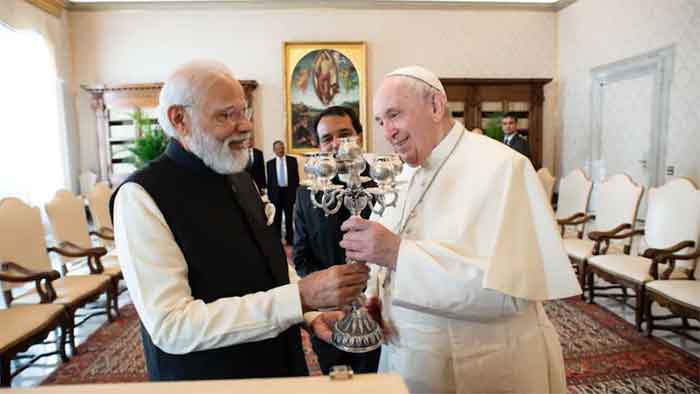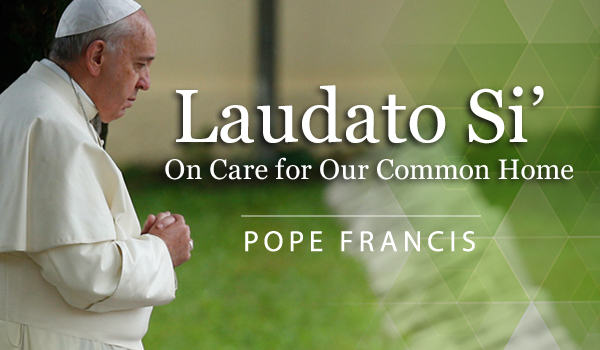
Pope Francis has presented his blueprint for a post-COVID-19 world, covering a vast number of issues from fraternity and income inequality to immigration and social injustice.
The Pope said the Covid-19 pandemic proved that free-market policies have failed to produce the societal benefits promised by their proponents.
Pope Francis began writing the document early this year, with the aim of focusing on interreligious dialogue following the landmark joint statement he signed in February 2019 in Abu Dhabi, United Arab Emirates, with Sheikh Ahmed el-Tayeb, the grand imam of Egypt’s Al-Azhar mosque and one of the highest authorities of Sunni Islam.
But, as Francis writes, the pandemic “unexpectedly erupted” and his focus widened, and the document became a treatise on the lessons that must be learned from the global health crisis.
Once the pandemic passes, the pope writes, “our worst response would be to plunge even more deeply into feverish consumerism and new forms of egotistic self-preservation.”
Marketplace
“The marketplace, by itself, cannot resolve every problem, however much we are asked to believe this dogma of neoliberal faith,” the pope wrote in his third encyclical, called “Fratelli Tutti”, to all Catholic bishops.
Pope Francis sounded downright woke in parts of a newly released encyclical, railing against free market, private property, racism and social injustice, but he couldn’t get through the title without offending some observers.
Trickle-down
So-called “trickle-down” economics fails to create the promised “spillover” that resolves inequality, giving rise to “new forms of violence threatening the fabric of society,” Francis said. It is imperative to adopt economic policies that favor “productive diversity and business creativity,” thereby creating lasting jobs, he added.
World systems
“The fragility of world systems in the face of the pandemic has demonstrated that not everything can be resolved by market freedom,” Francis said. Countries must recover a “sound political life” not dominated by financial speculators, he said, and “we must put human dignity back at the center and on that pillar build the alternative social structures we need.”
Inability to work together
“Aside from the differing ways that various countries responded to the crisis, their inability to work together became quite evident,” Francis wrote. “Anyone who thinks that the only lesson to be learned was the need to improve what we were already doing, or to refine existing systems and regulations, is denying reality.”
He cited the grave loss of millions of jobs as a result of the virus as evidence of the need for politicians to listen to popular movements, unions and marginalized groups and to craft more just social and economic policies.
Property
The pope’s vision for a post-Covid world is also leftist in terms of property rights as he noted that the Christian tradition has never recognized private-property rights as “absolute or inviolable,” and there is a “social purpose of all forms of private property.”
Francis said ownership of private property “can only be considered a secondary natural right,” secondary to the “universal destination of the earth’s goods” and the “right of all to their use.”
Divisiveness
He also railed against populism, nationalism, war, social-media divisiveness, the death penalty, and social injustice, and reiterated his views on the benefits of immigration.
The pope called racism “a virus that quickly mutates and, instead of disappearing, goes into hiding and lurks in waiting.”
Francis also called for “open societies that integrate everyone,” a line that would just as easily fit in a brochure for a George Soros-backed activist group.
“Every brother or sister in need, when abandoned or ignored by the society in which I live, becomes an existential foreigner, even though born in the same country,” he said.
“They may be citizens with full rights, yet they are treated like foreigners in their own country,” said the pope.
Slavery
The pope also questioned why it took so long for the Catholic Church to unequivocally to condemn slavery.
Social media
At another point in the document, he denounces the divisiveness caused by social media, lamenting that “social aggression has found unparalleled room for expansion through computers and mobile devices.”
He continues: “This has now given free rein to ideologies. Things that until a few years ago could not be said by anyone without risking the loss of universal respect can now be said with impunity, and in the crudest of terms, even by some political figures.”
War
At another point in the encyclical, Francis turns to the Catholic Church’s own doctrine on war, rejecting it as a means of legitimate defense.
“It is very difficult nowadays to invoke the rational criteria elaborated in earlier centuries to speak of the possibility of a ‘just war’. Never again war!”
“Fratelli Tutti” is Pope Francis’ third encyclical, and he signed it at the tomb of St. Francis in Assisi.
Although the encyclical was woke-friendly in many respects, its title, “Fratelli Tutti” translates to “Brothers All” in English – connoting male dominance to some.
The Vatican said the title was taken from the words of St. Francis of Assisi, the pope’s namesake, and could not be changed. And in any case, an encyclical is inherently addressed to the whole world, and the Italian word “Fratelli” means brothers but can be used to mean brothers and sisters.
The Rev. Thomas Reese, a Jesuit priest based in Washington, DC, said the title would cause the Vatican “self-inflicted wounds” and lamented that the church did not “get ahead of the curve for once.”
Catholic women’s rights activist Tina Beattie of the UK tweeted: “Language develops. Surely, you are not saying the language of the past binds us forever. Changing attitudes to women require linguistic changes.”
Annemarie Paulin-Campbell, a Jesuit school chief in South Africa, called “Fratelli Tutti” an “encyclical of love that misses the boat on women.”
Vatican encyclicals are the most authoritative form of papal teaching and they traditionally take their titles from the first two words of the document. In this case, “Fratelli Tutti” is a quote from the “Admonitions,” the guidelines penned by St. Francis in the 13th century.
SIGN UP FOR COUNTERCURRENTS DAILY NEWSLETTER















































